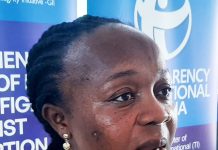
A 20-seater water closet toilet facility with wash and changing rooms has been commissioned for Kwadaso Ohwimase School for the benefit of the girl child.
The Ohwimase Basic School now has a newly-built child-friendly Water Sanitation and Health facility, while the learners will no longer need to worry how they will meet nature’s call.
A toilet and washroom have also been commissioned for Apatrapa Health Center and a water project for the residents of Agric Nzema, all in the Kwadaso Municipality.
The projects come under the Water, Sanitation and Hygiene (WASH) Component of the COVID-19 response projects, which have since been handed over to the Kwadaso Municipality.
Ms. Anne Claire, Representative of UNICEF to Ghana, joined Madam Cecilia Arena Dinah, Tom Norring and Dr. Clifford Baima, Minister of Sanitation and Water Resources, Denmark Ambassador to Ghana and Managing Director of Ghana Water Company Limited respectively commissioned the projects recently.
Commissioning the projects, Ms. Claire disclosed that only 60% of urban settlements, per
statistics from UNICEF, had access to water within their premises, while the rest of the urban population, including people from low-income communities, fetch water from private vendors managed water points.
Anne Claire disclosed that the programme, which was originally intended to be a one-year project, was further extended for one year to address the challenges of WASH infrastructure development in high-density settlements, and market price rising for construction materials and amendments of the contracts.
She said the interventions had made an immense contribution to the COVID-response, through water supply, sanitation and hygiene promotion in communities, schools, health facilities and public spaces, benefitting tens of thousands of vulnerable families and their children from low-income settlements across nine communities.
She said 11 kilometres of pipelines had been laid to enhance access to safe water for about 16,100 people across three communities.
This, she said, was out of the overall total of 33km pipeline work under the project, improving access to about 69,000 in Accra and Kumasi, while 410 low-income families had water connections in their yards, with a flexible payment system, while five Automatic Water Vending
Stations had been established.
She indicated that WASH infrastructure of eight schools, seven health facilities, and three public places were fully rehabilitated or expanded to meet the minimum WASH IPC requirements.
The UNICEF Rep urged the Minister and the Managing Director of the Ghana Water Company Limited to expand this approach in all low-income urban areas.
She thanked the Government of Denmark for the generous support to Ghana in the most difficult time of the COVID-19 pandemic to enable the country move closer to reaching the Sustainable Development Goal 6.
She commended the Government of Ghana, the sector Minister of Sanitation and Water Resources, the Ashanti Regional Minister, Ghana Water Company, participating Municipal Assemblies and Ministries, Departments and Agencies for the continued close partnership with
UNICEF to implement key multi-sectoral interventions to effectively target and reach the most vulnerable families, women, and children in Ghana.
Madam Cecilia Abena Dapaah, Minister for Sanitation and Water Resources, explained that the Municipality was one of seven benefiting from the programme in the Greater Accra and Kumasi Metropolis.









